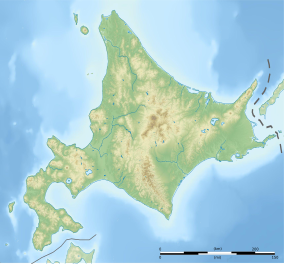Rishiri-Rebun-Sarobetsu National Park
| Rishiri-Rebun-Sarobetsu National Park | |
|---|---|
| 利尻礼文サロベツ国立公園 | |
 Mount Rishiri | |
| Location | Hokkaidō, Japan |
| Nearest city | Wakkanai |
| Coordinates | 45°11′38″N 141°15′29″E / 45.1939°N 141.258°E |
| Area | 241.66 km2 (93.31 sq mi) |
| Established | September 20, 1974 |
| Governing body | Ministry of the Environment (Japan) |
| Official name | Sarobetsu-genya |
| Designated | 8 November 2005 |
| Reference no. | 1555[1] |

Rishiri-Rebun-Sarobetsu National Park (利尻礼文サロベツ国立公園, Rishiri Rebun Sarobetsu Kokuritsu Kōen) is a national park on the Rishiri Island, Rebun Island, and a coastal area from Wakkanai to Horonobe at the north-western tip of Hokkaidō, Japan. Areas of the park cover 212.22 square kilometres (81.94 sq mi).[2][3][4] The park is noted for its alpine flora and views of volcanic mountains and areas formed by marine erosion.[3][4] The park is surrounded by fishing grounds, and the coastal areas of the park are rich in kelp.[2] The coastal areas of the national park can be accessed from Japan National Route 40, known as the Wakkanai National Highway, and the Rishiri and Rebun are accessible by ferry from Wakkanai.
The park was established in 1974 by the Ministry of Environment.[5]
Geography
[edit]Rishiri Island
[edit]Rishiri Island (利尻島, Rishiri-tō), separated from Hokkaido by the Rishiri Channel, was formed by the cone-shaped extinct volcanic peak of Mount Rishiri (1,721 metres (5,646 ft)).[4] The island is 63 kilometres (39 mi) in circumference and covers 183 square kilometres (71 sq mi).[6]
Rebun Island
[edit]Rebun Island (礼文島, Rebun-tō) is approximately 30 kilometres (19 mi) west of Wakkanai in Hokkaido. The island is 72 kilometres (45 mi) in circumference and covers 82 square kilometres (32 sq mi). Rebun reaches its highest altitude at Rebundake.[2][7]
Sarobetsu Plain
[edit]The Sarobetsu Plain (サロベツ原野, Sarobetsu Gen'ya) is a marshy floodplain on the Sea of Japan formed by the Teshio River and Sarobetsu River.[3] The plain is approximately 17 kilometres (11 mi) long and covers approximately 150 square kilometres (58 sq mi).[2] The Sarobetsu Plain has a subarctic climate and consists of large peat bogs.[8] The Sarobetsu Plain was added to the Ramsar List of Wetlands of International Importance in 2005 as part of the Ramsar Convention, an international treaty for the conservation of wetlands.[4]
See also
[edit]References
[edit]- ^ "Sarobetsu-genya". Ramsar Sites Information Service. Retrieved 25 April 2018.
- ^ a b c d "Rishiri-Rebun-Sarobetsu National Park". Encyclopedia of Japan. Tokyo: Shogakukan. 2012. OCLC 56431036. Archived from the original on 2007-08-25. Retrieved 2012-06-03.
- ^ a b c "利尻礼文サロベツ国立公園" [Rishiri-Rebun-Sarobetsu National Park]. Dijitaru daijisen (in Japanese). Tokyo: Shogakukan. 2012. OCLC 56431036. Archived from the original on 2007-08-25. Retrieved 2012-06-03.
- ^ a b c d "利尻礼文サロベツ国立公園" [Rishiri-Rebun-Sarobetsu National Park]. Nihon Daihyakka Zensho (Nipponika) (in Japanese). Tokyo: Shogakukan. 2012. OCLC 153301537. Archived from the original on 2007-08-25. Retrieved 2012-06-02.
- ^ "Rishiri-Rebun-Sarobetsu National Park". www.japan.travel. Retrieved 2025-01-25.
- ^ "Rishiri". Encyclopedia of Japan. Tokyo: Shogakukan. 2012. OCLC 56431036. Archived from the original on 2007-08-25. Retrieved 2012-06-03.
- ^ "Rebun". Encyclopedia of Japan. Tokyo: Shogakukan. 2012. OCLC 56431036. Archived from the original on 2007-08-25. Retrieved 2012-06-03.
- ^ "Sarobetsu Plain". Encyclopedia of Japan. Tokyo: Shogakukan. 2012. OCLC 56431036. Archived from the original on 2007-08-25. Retrieved 2012-06-03.
External links
[edit]- (in English) Rishiri-Rebun-Sarobetsu National Park - National Parks of Japan
- (in Japanese) Rishiri-Rebun-Sarobetsu National Park - National Parks of Japan
- https://web.archive.org/web/20120204040019/http://www.biodic.go.jp/english/jpark/np/risiri_e.html



